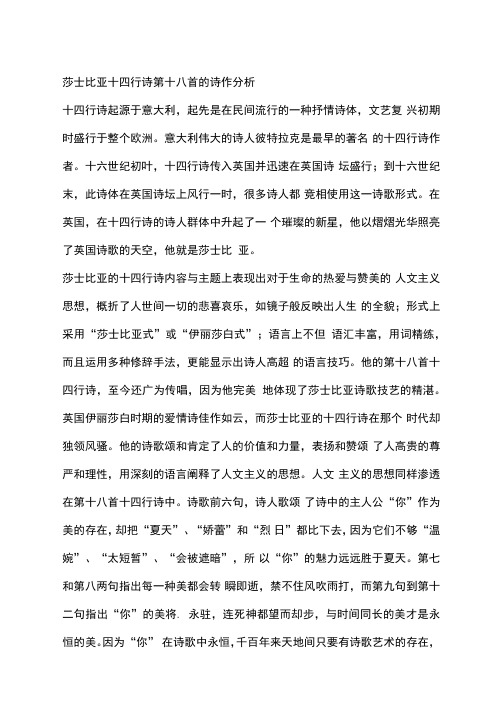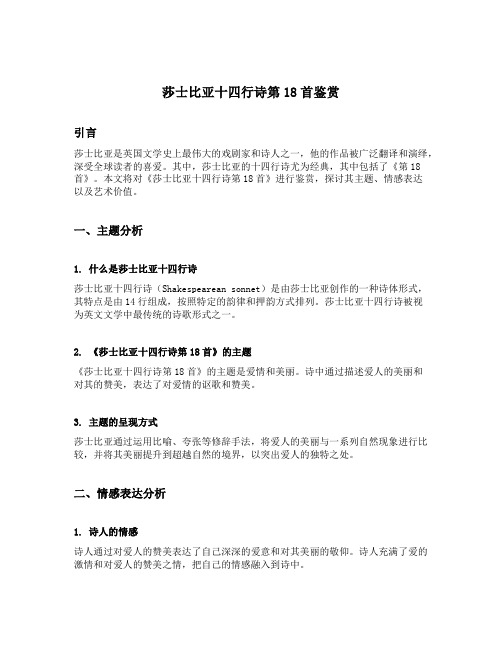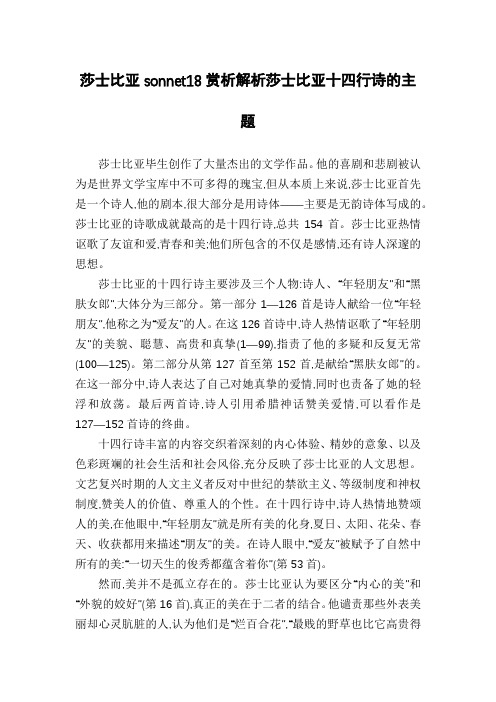十四行诗及Sonnet 18赏析
莎士比亚十四行诗第十八首的诗作分析

莎士比亚十四行诗第十八首的诗作分析十四行诗起源于意大利,起先是在民间流行的一种抒情诗体,文艺复兴初期时盛行于整个欧洲。
意大利伟大的诗人彼特拉克是最早的著名的十四行诗作者。
十六世纪初叶,十四行诗传入英国并迅速在英国诗坛盛行;到十六世纪末,此诗体在英国诗坛上风行一时,很多诗人都竞相使用这一诗歌形式。
在英国,在十四行诗的诗人群体中升起了一个璀璨的新星,他以熠熠光华照亮了英国诗歌的天空,他就是莎士比亚。
莎士比亚的十四行诗内容与主题上表现出对于生命的热爱与赞美的人文主义思想,概折了人世间一切的悲喜哀乐,如镜子般反映出人生的全貌;形式上采用“莎士比亚式”或“伊丽莎白式”;语言上不但语汇丰富,用词精练,而且运用多种修辞手法,更能显示出诗人高超的语言技巧。
他的第十八首十四行诗,至今还广为传唱,因为他完美地体现了莎士比亚诗歌技艺的精湛。
英国伊丽莎白时期的爱情诗佳作如云,而莎士比亚的十四行诗在那个时代却独领风骚。
他的诗歌颂和肯定了人的价值和力量,表扬和赞颂了人高贵的尊严和理性,用深刻的语言阐释了人文主义的思想。
人文主义的思想同样渗透在第十八首十四行诗中。
诗歌前六句,诗人歌颂了诗中的主人公“你”作为美的存在,却把“夏天”、“娇蕾”和“烈日”都比下去,因为它们不够“温婉”、“太短暂”、“会被遮暗”,所以“你”的魅力远远胜于夏天。
第七和第八两句指出每一种美都会转瞬即逝,禁不住风吹雨打,而第九句到第十二句指出“你”的美将. 永驻,连死神都望而却步,与时间同长的美才是永恒的美。
因为“你” 在诗歌中永恒,千百年来天地间只要有诗歌艺术的存在,诗歌和“你” 就能够永生。
所以“你”的美永不枯凋,这是一种生命的美,艺术的美,永驻人间。
诗人不但歌颂了美,还赞扬了爱。
诗人对“你”的歌颂与赞美不仅停留在对外在美的迷恋,而且歌颂了“你”的美德,因为这种美才能艳压群芳,连死神在他而前也不敢夸口。
这就是智慧的美,最有力量的美,因为它是与爱紧紧相连的。
十四行诗第十八首

起承转合
表 年 凡头明轻响四他友的行所 人 美是歌 的 丽“颂 不 ;起的 同”承,宣貌所过后告难爱他四虽以的的行然存人不是别留却朽“人,可的转的可以诗”美他通篇, 来得以永存
合
中间四行是
最后两行是“合”,是对 一首诗所作的小结。以富
起
“承”,讲岁 月无常,青春 难驻
转有诗思歌辨艺的术以语及言所总歌结颂了对人象类、 之间的关联:只要人类尚
Part 2
诗歌欣赏
Shall I compare thee to a summer's day? Thou art more lovely and more temperate, Rough winds do shake the darling buds of May, And summer's lease hath all too short a date. Sometime too hot the eye of heaven shines, And often is his gold complexion dimm'd, And every fair from fair sometime declines, By chance or nature's changing course untrimm'd, But thy eternal summer shall not fade. Nor lose possession of that fair thou owest, Nor shall Death brag thou wander'st in his shade When in eternal lines to time thou growest. So long as men can breathe or eyes can see, So long lives this and this gives life to thee.
莎士比亚十四行诗第18首鉴赏

莎士比亚十四行诗第18首鉴赏引言莎士比亚是英国文学史上最伟大的戏剧家和诗人之一,他的作品被广泛翻译和演绎,深受全球读者的喜爱。
其中,莎士比亚的十四行诗尤为经典,其中包括了《第18首》。
本文将对《莎士比亚十四行诗第18首》进行鉴赏,探讨其主题、情感表达以及艺术价值。
一、主题分析1. 什么是莎士比亚十四行诗莎士比亚十四行诗(Shakespearean sonnet)是由莎士比亚创作的一种诗体形式,其特点是由14行组成,按照特定的韵律和押韵方式排列。
莎士比亚十四行诗被视为英文文学中最传统的诗歌形式之一。
2. 《莎士比亚十四行诗第18首》的主题《莎士比亚十四行诗第18首》的主题是爱情和美丽。
诗中通过描述爱人的美丽和对其的赞美,表达了对爱情的讴歌和赞美。
3. 主题的呈现方式莎士比亚通过运用比喻、夸张等修辞手法,将爱人的美丽与一系列自然现象进行比较,并将其美丽提升到超越自然的境界,以突出爱人的独特之处。
二、情感表达分析1. 诗人的情感诗人通过对爱人的赞美表达了自己深深的爱意和对其美丽的敬仰。
诗人充满了爱的激情和对爱人的赞美之情,把自己的情感融入到诗中。
2. 诗中情感的转折《莎士比亚十四行诗第18首》中情感经历了由赞美到忧伤的转折。
在诗的前几行,诗人对爱人进行了赞美,表达了自己对其美丽的深深敬仰之情。
然而,在诗的后半部分,情感转向了忧伤,诗人担心时间的流逝会将爱人的美丽消逝,这种忧伤的情感为整首诗增添了深刻的情感色彩。
三、艺术价值分析1. 诗歌运用的修辞手法《莎士比亚十四行诗第18首》使用了丰富多样的修辞手法,比如比喻、夸张、对比等,这些修辞手法使整首诗充满了艺术魅力,具有很高的艺术价值。
2. 渲染的意境诗中通过对爱人美丽的描绘和对时间流逝的担忧,营造了一种诗意的意境。
诗人通过对自然现象的描绘,将爱人的美丽与大自然相较,突出了爱人的独特之处,同时也增加了诗歌的艺术感染力。
3. 对爱情的思考《莎士比亚十四行诗第18首》可以说是对爱情最美丽和深刻的思考之一。
莎士比亚第十八首十四行诗

莎士比亚的第十八首十四行诗是一首非常著名的诗,也是他最为人们熟知的一首。
这首诗的主题是爱与时间,诗人用简洁而富有感情的语言表达了对爱和时间的思考。
以下是对这首诗的分析:
诗的开头,“Sonnet 18”指的是这首诗是一首十四行诗,这是莎士比亚写的一组共154首的十四行诗中的第18首。
“Rough winds do shake the darling buds of May”描述的是五月的花在狂风中摇曳的景象,这可以看作是对美丽但脆弱生命的象征。
“And summer's lease hath all too short a date”则提到了夏天的短暂,暗示时间的无情流逝。
“Sometimes too hot the eys of heaven shines”和“And often is his gold complexion dimmed”进一步描述了自然景观的变化,表达了时间的无情和生命的短暂。
然而,尽管诗中充满了对生命无常和时间流逝的描绘,但最后几行却表达了乐观和永恒的观点。
“But thy eternal summer shall not fade”和“Nor shall death barge his all-corrective shallop”暗示了即使在时间的长河中,爱可以永存。
总的来说,莎士比亚在这首诗中通过自然景观的变化和生命的短暂,表达了对时间无情流逝的哀叹和对生命无常的感慨。
然而,他又以乐观和充满希望的态度暗示了爱的永恒。
赏析莎士比亚第十八首十四行诗

莎士比亚的第十八首十四行诗是他的著名作品之一,也是莎士比亚十四行诗系列中的代表之作。
这首诗以其优美的语言、深刻的内涵和情感打动了无数读者,成为了英国文学史上的经典之作。
本文将对这首诗进行赏析,从其结构、语言、意象等方面探究其魅力所在。
1. 结构分析莎士比亚的第十八首十四行诗采用了典型的莎士比亚十四行诗结构,即三个四行组成的三重四行联结构加上最后的两行组成。
这种结构被称为“莎士比亚十四行诗”或者“莎士比亚诗体”。
每个四行是一个意象和思想完整的单元,整首诗共有三个意象,构成了一个完美的整体。
2. 语言风格莎士比亚以其精湛的写作技巧和丰富的表现手法而备受称赞。
在第十八首十四行诗中,莎士比亚运用了丰富的修辞和意象,如比喻、拟人、排比等,使整首诗充满了生动的形象和深刻的思想。
他的诗句简练、优美,字里行间蕴含着丰富的情感和哲理。
3. 情感表达在第十八首十四行诗中,莎士比亚表达了对爱情的赞美和颂扬,同时反映了对时间流逝和生命短暂的感慨。
他通过丰富的意象和动人的语言,将爱情的美好与时间的无情相结合,表达了对永恒美好的追求和珍惜。
整首诗用“你”和“我”交织,展现了一种深沉的情感和对爱情的信仰。
4. 意象赏析在第十八首十四行诗中,莎士比亚运用了许多意象来赞美爱情和探讨永恒。
“你的美丽”、“夏天的一天”、“时间的倒流”等意象,都展现了爱情的美好和永恒。
这些意象在诗中起到了丰富的象征意义,使整首诗充满了深刻的内涵和情感。
5. 主题探讨莎士比亚的第十八首十四行诗主要探讨了爱情、美好与永恒的主题。
他通过丰富的意象和深刻的思想,表达了对爱情的赞美和对永恒美好的追求。
与此他也深刻地反映了时间的流逝和生命的短暂,从而给予读者对生命的思考和感悟。
莎士比亚的第十八首十四行诗以其优美的语言、深刻的内涵和情感打动了无数读者。
通过对其结构、语言、意象、情感和主题的赏析,我们不仅更深刻地理解了这首诗的魅力所在,也更深刻地领略了莎士比亚伟大的艺术魅力。
Sonnet18赏析

赏析:莎士比亚所处的英国伊莉莎白时代是爱情诗的盛世,写十四行诗更是一种时髦。
莎士比亚的十四行诗无疑是那个时代的佼佼者,其十四行诗集更是流传至今,魅力不减。
他的十四行诗一扫当时诗坛的矫柔造作、绮艳轻糜、空虚无力的风气。
据说,莎士比亚的十四行诗是献给两个人的:前126首献给一个贵族青年,后面的献给一个黑肤女郎。
这首诗是十四行诗集中的第18首,属前者。
也有人说,他的十四行诗是专业的文学创作。
当然,这些无关宏旨,诗歌本身是伟大的。
莎士比亚的十四行诗总体上表现了一个思想:爱征服一切。
他的诗充分肯定了人的价值、赞颂了人的尊严、个人的理性作用。
诗人将抽象的概念转化成具体的形象,用可感可见的物质世界,形象生动地阐释了人文主义的命题。
诗的开头将“你”和夏天相比较。
自然界的夏天正处在绿的世界中,万物繁茂地生长着,繁阴遮地,是自然界的生命最昌盛的时刻。
那醉人的绿与鲜艳的花一道,将夏天打扮得五彩缤纷、艳丽动人。
但是,“你”却比夏天可爱多了,比夏天还要温婉。
五月的狂风会作践那可爱的景色,夏天的期限太短,阳光酷热地照射在繁阴班驳的大地上,那熠熠生辉的美丽不免要在时间的流动中凋残。
这自然界最美的季节和“你”相比也要逊色不少。
而“你”能克服这些自然界的不足。
“你”在最灿烂的季节不会凋谢,甚至“你”美的任何东西都不会有所损失。
“你”是人世的永恒,“你”会让死神的黑影在遥远的地方停留,任由死神的夸口也不会死去。
“你”是什么“你”与人类同在,你在时间的长河里不朽。
那人类精神的精华——诗,是你的形体吗或者,你就是诗的精神,就是人类的灵魂。
诗歌在形式上一改传统的意大利十四行诗四四三三体,而是采用了四四四二体:在前面充分地发挥表达的层次,在充分的铺垫之后,用两句诗结束全诗,点明主题。
全诗用新颖巧妙的比喻,华美而恰当的修饰使人物形象鲜明、生气鲜活。
诗人用形象的表达使严谨的逻辑推理变得生动有趣、曲折跌宕,最终巧妙地得出了人文主义的结论。
Shakespeare - Sonnet 18 This sonnet is by far one of the most interesting poems in the book. Of Shakespeare's sonnets in the text, this is one of the most moving lyric poems that I have ever read. There is great use of imagery within the sonnet. This is not to say that the rest of the poems in the book were not good, but this to me was the best, most interesting, and most beautiful of them. It is mainly due to the simplicity and loveliness of the poem抯praise of the beloved woman that it has guaranteed its place in my mind, and speaker of the poem opens with a question that is addressed to the beloved, "Shall I compare thee to a summer's day" This question is comparing her to the summer time of the year. It is during this time when the flowers are blooming, trees are full of leaves, the weather is warm, and it is generally thought of as an enjoyable time during the year. The following eleven lines in the poem are also dedicated to similar comparisons between the beloved and summer days. In lines 2 and 3, the speaker explains what mainly separates the young woman from the summer's day: she is "more lovely and more temperate." (Line 2) Summer's days tend toward extremes: they are sometimes shaken by "rough winds" (line3) which happens and is not always as welcoming as the woman. However in line 4, the speaker gives the feeling again that the summer months are often to short by saying, "And summer抯lease hath too short a date." In the summer days, the sun, "the eye of heaven" (line 5), often shines "too hot," or too dim, "his gold complexion dimmed" (line 6), that is there are many hot days during the summer but soon the sun begins to set earlier at night because autumn is approaching. Summer is moving along too quickly for the speaker, its time here needs to be longer, and it also means that the chilling of autumn is coming upon us because the flowers will soon be withering, as "every fair from fair sometime declines." (Line 7) The final portion of the sonnet tells how the beloved differs from the summer in various respects. Her beauty will be one that lasts forever, "Thy eternal summer shall not fade." (Line 9), and never end or die. In the couplet at the bottom, the speaker explains how that the beloved's beauty will accomplish this everlasting life unlike a summer. And it is because her beauty is kept alive in this poem, which will last forever. It will live "as long as men can breathe or eyes can see." (Line 13)On the surface, the poem is on the surface simply a statement of praise about the beauty ofthe beloved woman and perhaps summer to the speaker is sometimes too unpleasant with the extremes of windiness and heat that go along with it. However, the beloved in the poem is always mild and temperate by her nature and nothing at all like the summer. It is incidentally brought to life as being described as the "eye of heaven" with its "gold complexion". The imagery throughout the sonnet is simple and attainable to the reader, which is a key factor in understanding the poem. Then the speaker begins to describe the summer again with the "darling buds of May" giving way to the " summer抯lease", springtime moving into the warmth of the summer. The speaker then starts to promise to talk about this beloved, that is so great and awing that she is to live forever in this sonnet. The beloved is so great that the speaker will even go as far as to say that, "So long as men breathe, or eyes can see," the woman will live. The language is almost too simple when comparing it to the rest of Shakespeare抯sonnets; it is not heavy with alliteration or verse, and nearly every line is its own self-contained clause, almost every line ends with some punctuation that effects a pause. But it is this that makes Sonnet18 stand out for the rest in the book. It is much more attainable to understand and it allows for the reader to fully understand how great this beloved truly is because she may live forever in it. An important theme of the sonnet, as it is an important theme throughout much of the poetry in general, is the power of the speaker's poem to defy time and last forever. And so by doing this it is then carrying the beauty of the beloved down to future generations and eventually for al of eternity. The beloved's "eternal summer" shall not fade precisely because it is embodied in the sonnet: "So long as men can breathe or eyes can see," (line 13) the speaker writes in the couplet, "So long lives this, and this gives life to thee."(Line 14) With this the speaker is able to accomplish what many have done in poetry and that is to give the gift of an eternal life to someone that they believe is special and outshines everyone else around them. Perhaps it is because of a physical beauty that the speaker see, but I believe that it is more because of the internal beauty as seen in line 2, "Thou art more lovely and more temperate", that the beloved is deserving to live on forever.。
莎士比亚十四行诗第十八首的诗作分析

莎士比亚十四行诗第十八首的诗作分析莎士比亚的第十八首十四行诗是一首赞美年轻朋友的诗,同时也表达了时间的无情和生命的短暂。
这首诗分为三部分:引言、矛盾和解决矛盾。
一、引言在引言部分,诗人表达了他对朋友的赞美之情。
他把朋友比作夏天的美好,认为朋友的美丽和魅力就像夏天一样灿烂和耀眼。
诗人用生动的语言描述了夏天的美好,比如“你的永恒夏季定会在诗中发扬”。
这里,诗人使用了“永恒夏季”这个比喻来形容朋友的美丽和魅力,表达了他对朋友的无限赞美之情。
二、矛盾然而,在诗的第二部分,诗人引入了一个矛盾。
他写道,“尽管篡改大自然的定规,你还是会衰老”。
这里,诗人指出尽管朋友现在年轻美丽,但是时间是无情的,朋友也会随着时间的推移而衰老。
这个矛盾在诗人的心中引起了深深的忧虑和不安。
三、解决矛盾在第三部分,诗人试图解决这个矛盾。
他提出了一个假设,“但你的不朽将超越人的命运”。
这里,诗人认为朋友的美德和才华将使他/她在人们的心中永存不朽。
诗人认为,尽管时间会摧毁人的肉体,但是人的精神和美德将永存不朽。
诗人接着写道,“当自然的岁月悄然流逝,你的美将留在诗篇里”。
这里,诗人表达了他对诗歌的信仰,认为诗歌可以使人的美德和才华永存不朽。
最后,诗人总结了他的观点,“只有美德才能流芳百世”。
这里,诗人强调了美德的重要性,认为只有美德才能真正使人永存不朽。
四、主题和意义这首诗的主题是时间和生命的短暂以及美德的不朽。
诗人通过对朋友的赞美和忧虑,表达了他对时间的无情和生命的短暂的感慨。
然而,他也指出美德和精神可以超越时间和生命的限制,永存不朽。
这首诗的意义在于提醒人们珍惜时间和生命,追求美德和精神的不朽。
五、艺术手法这首诗的艺术手法主要包括比喻、对比和象征等。
诗人通过比喻将朋友比作夏天的美好,突出了朋友的美丽和魅力。
同时,诗人也通过对比引入了矛盾,指出时间是无情的,朋友也会衰老。
最后,诗人通过象征将诗歌视为美德和精神的不朽载体,强调了诗歌的价值和意义。
莎士比亚sonnet18赏析解析莎士比亚十四行诗的主题

莎士比亚sonnet18赏析解析莎士比亚十四行诗的主题莎士比亚毕生创作了大量杰出的文学作品。
他的喜剧和悲剧被认为是世界文学宝库中不可多得的瑰宝,但从本质上来说,莎士比亚首先是一个诗人,他的剧本,很大部分是用诗体――主要是无韵诗体写成的。
莎士比亚的诗歌成就最高的是十四行诗,总共154首。
莎士比亚热情讴歌了友谊和爱,青春和美;他们所包含的不仅是感情,还有诗人深邃的思想。
莎士比亚的十四行诗主要涉及三个人物:诗人、“年轻朋友”和“黑肤女郎”,大体分为三部分。
第一部分1―126首是诗人献给一位“年轻朋友”,他称之为“爱友”的人。
在这126首诗中,诗人热情讴歌了“年轻朋友”的美貌、聪慧、高贵和真挚(1―99),指责了他的多疑和反复无常(100―125)。
第二部分从第127首至第152首,是献给“黑肤女郎”的。
在这一部分中,诗人表达了自己对她真挚的爱情,同时也责备了她的轻浮和放荡。
最后两首诗,诗人引用希腊神话赞美爱情,可以看作是127―152首诗的终曲。
十四行诗丰富的内容交织着深刻的内心体验、精妙的意象、以及色彩斑斓的社会生活和社会风俗,充分反映了莎士比亚的人文思想。
文艺复兴时期的人文主义者反对中世纪的禁欲主义、等级制度和神权制度,赞美人的价值、尊重人的个性。
在十四行诗中,诗人热情地赞颂人的美,在他眼中,“年轻朋友”就是所有美的化身,夏日、太阳、花朵、春天、收获都用来描述“朋友”的美。
在诗人眼中,“爱友”被赋予了自然中所有的美:“一切天生的俊秀都蕴含着你”(第53首)。
然而,美并不是孤立存在的。
莎士比亚认为要区分“内心的美”和“外貌的姣好”(第16首),真正的美在于二者的结合。
他谴责那些外表美丽却心灵肮脏的人,认为他们是“烂百合花”,“最贱的野草也比它高贵得多”(第94首)。
诗人不但赞颂人的美,还赞颂人的永恒。
在十四行诗中,莎士比亚经常提到时间,认为它是青春和美丽不共戴天的敌人。
因为时间“要把你青春的白昼化作黑夜”(第15首),所以美会变丑、生命会终结。
- 1、下载文档前请自行甄别文档内容的完整性,平台不提供额外的编辑、内容补充、找答案等附加服务。
- 2、"仅部分预览"的文档,不可在线预览部分如存在完整性等问题,可反馈申请退款(可完整预览的文档不适用该条件!)。
- 3、如文档侵犯您的权益,请联系客服反馈,我们会尽快为您处理(人工客服工作时间:9:00-18:30)。
pentameter
• a pentameter is a line of verse consisting of five metrical feet, •an iambic pentameter has 10 syllables .
iambic • an unstressed/stressed combination of syllables in a metrical foot
iambic
• a lightly stressed syllable followed by a heavily stressed syllable • Example:
Wyatt in mid-16th century.
Rhyme scheme
• the Italian or Petrarchan sonnet: abba abba cdc dcd • the Shakespearian or English sonnet : abab cdcd efef gg
Theme of Sonnet 18
• Praising the beauty of the young man • Transience of beauty in nature • Immortality of art in general (poetry in particular)
Rhetorical devices • simile, • metaphor, • inversion, • personification, • exaggeration, • contrast
Introduction of Sonnets
• Sonnets (十四行诗/商赖诗): a poem in 14 lines. • Originated in Italy, a form very popular in Renaissance Europe, especially in Italy, France and England. • Brought to England by Thomas
• 死亡不会夸,你在它影下低回, 有这些诗行将你的韶光永葆: 只要人们还活着,眼睛还能看, 这首诗便能栩栩赋与你霞丹。
• 孙大雨(1905--1997):文学翻译家,诗 人。我国第一位用诗体翻译莎士比亚诗 剧的学者,第一位尝试写作十四行诗的 诗人,文学史家唐弢曾称孙大雨的十四 行诗是中国诗人中写得最好的。
• Sometime too hot the eye of heaven shines, And often is his gold complexion dimm'd, And every fair from fair sometime declines, By chance, or nature's changing course untrimm'd:
Petrarch
• (1304 –1374) • an Italian scholar, poet, and early humanist. • Petrarch and Dante are considered the fathers of the Renaissance.
• A sonnet is a fourteen-line lyric poem, traditionally written in iambic pentameter (五音步抑扬格) • that is, in lines ten syllables long, with accents falling on every second syllable, as in: • "Shall I compare thee to a summer's day?"
• 注: 屠岸(192Leabharlann ~) ,文学翻译家,诗人。 屠岸 ~
• 梁实秋译文: 我可能把你和夏天相比拟? 你比夏天更可爱更温和: 狂风会把五月的花苞吹落地 夏天也嫌太短促,匆匆而过。
•有时太阳照得太热, 常常又遮暗他的金色的脸; 美的事物总不免要凋落, 偶然的,或是随自然变化而流转。
• 但是你的永恒之夏不会褪色, 你不会失去你的俊美的仪容; 死神不能夸说你在它的阴影里面走 着, 如果你在这不朽的诗句里获得了永 生; 只要人们能呼吸,眼睛能看东西, 此诗就会不朽,使你永久生存下去。
iambic pentameter
• popular English verse form consisting of five metrical feet--with each foot consisting of an iamb (ie, an unstressed syllable followed by a stressed syllable: daDUM).
Shakespeare's Sonnets
Sonnet 18
• Shall I compare thee to a summer's day? Thou art more lovely and more temperate: Rough winds do shake the darling buds of May, And summer's lease hath all too short a date:
• 有时候苍天的巨眼照得太灼热, 他那金彩的脸色也会被遮暗; 每一种美呀,总会离开美而凋落, 被时机或者自然的代谢所摧残。 但是你永久的夏天决不会凋枯, 你永远不会失去你美的形相;
• 死神夸不着你在他影子里踯躅, 你将在不朽的诗中与时间同长; 只要人类在呼吸,眼睛看得见, 我这诗就活着,使你生命绵延。
• But thy eternal summer shall not fade, Nor lose possession of that fair thou ow'st, Nor shall death brag thou wander'st in his shade, When in eternal lines to time thou grow'st,
Shakespeare’s 154 sonnets
• Sonnets 1-126: addressed to a young man • Sonnets 127-152: addressed to “Dark Lady” • Sonnets 153-154: addressed to Cupid, the God of love in Greek mythology
• So long as men can breathe, or eyes can see, So long lives this, and this gives life to thee.
名家译文欣赏
• 屠岸译文: 能不能让我来把你比作夏日? 你可是更加可爱,更加温婉; 狂风会吹落五月里开的好花儿。 夏季租出的日子又未免太短暂:
• Sonnets were also written during the height of classical English verse, by Dryden and Pope, among others, • and written again during the heyday of English Romanticism, when Wordsworth, Shelley, and particularly John Keats created wonderful sonnets. • Today, the sonnet remains the most influential and important verse form in the history of English poetry.
• 注:梁实秋(1903—1987), 著名文学评论家、散文家、翻译家
• 孙大雨译文: 我可要将你比作初夏的清晖? 你却焕耀得更可爱,也更温婉; 狂风震撼五月天眷宠的嫩蕊, 孟夏的良时便会变得太短暂。
• 晴空里赤日有时光照得过亮, 它那赫奕的金容会转成阴晦; 被机运或被造化变迁所跌宕, 任何美妙的形象会显得不美。 但你这丰华的永夏不会衰颓, 你不会丧失你这无比的修好;
iambic pentameter
• Rhymed pairs of iambic pentameter are called heroic couplets (a form associated with Chaucer and Pope). • Unrhymed iambic pentameter is called blank verse (a form associated with Shakespeare and Milton).
十四行诗网址
• http://www.shakespea / •有文本,有图片少数
